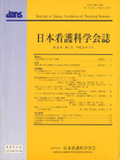Japanese
English
- 販売していません
- Abstract 文献概要
- 参考文献 Reference
- サイト内被引用 Cited by
要旨
本研究は,療養の場を問わず使用できる病気の不確かさ尺度(UUIS)を開発し,その信頼性と妥当性を検討した.研究は2段階からなり研究1では,53項目のUUIS原案を患者手記やインタビューデータを元に作成した.
研究2では,2つの調査を行った.調査1では,様々な疾患の外来・入院患者535名のデータを元に探索的因子分析を行い26項目6因子構造(【生活予測不能性】【情報解釈の複雑性】【病気意味の手がかり欠如】【病気性質の曖昧性】【病気回復の予測不能性】【闘病力への自信の揺らぎ】)のUUISを採択した.UUIS全項目および6下位尺度ともに十分な内的整合性が得られた.併存的妥当性ではUUISとSTAI,POMSの抑うつ,マスタリー尺度と1%水準で有意な相関が認められた.なお,確認的因子分析によりUUISは容認できる適合度を有していた.
調査2では,2型糖尿病患者で再現性を検討したところUUIS総得点では相関係数が0.74であった.
以上の結果から,UUISは更なる検討が必要であるが,臨床での使用基準を充たしていると判断できた.
Abstract
The purpose of this study is to develop a universal uncertainty in illness scale (UUIS) which can apply to both inpatients and outpatients. The research was conducted in 2 studies.
The first study developed a draft questionnaire of UUIS which consisted of 53 items selected from published patients' notes and interview transcripts of patients who suffer from various diseases.
The second study consisted of two surveys. The first survey tested the reliability and the validity of UUIS. Data was obtained from 535 inpatients and outpatients suffering from various diseases. Construct validity was tested with exploratory factor analysis and resulted in a 6-factor solution with 26 items ((1) Unpredictability of Daily Life; (2) Complexity of Interpretation of Information; (3) Lack of Cues Finding Meaning in Illness; (4) Ambiguity of Characteristics of Illness; (5) Unpredictability Recovery from Illness; (6) Instability of Self-confidence in Carrying on a Struggle against Illness). The total score and subscale score of UUIS showed excellent internal consistency. Sufficient concurrent validity was confirmed by the State-Trait Anxiety Inventory, POMS-SF Depression/Dejection subscale, and the Mastery scale with a 1% level of significance. In addition, confirmatory factor analyses indicated that a 6-factor model for the 26-item UUIS was valid.
The second survey tested test-retest reliability for 36 patients with type 2 diabetes mellitus. The results of Spearman's correlation coefficients resulted in a total score that was generally good (ρ=0.74) but three subscale scores were under the level of 0.7.
The results of this study suggest this scale is in need of further refinement, but is considered an efficient tool for clinical use.
Copyright © 2012, Japan Academy of Nursing Science. All rights reserved.


